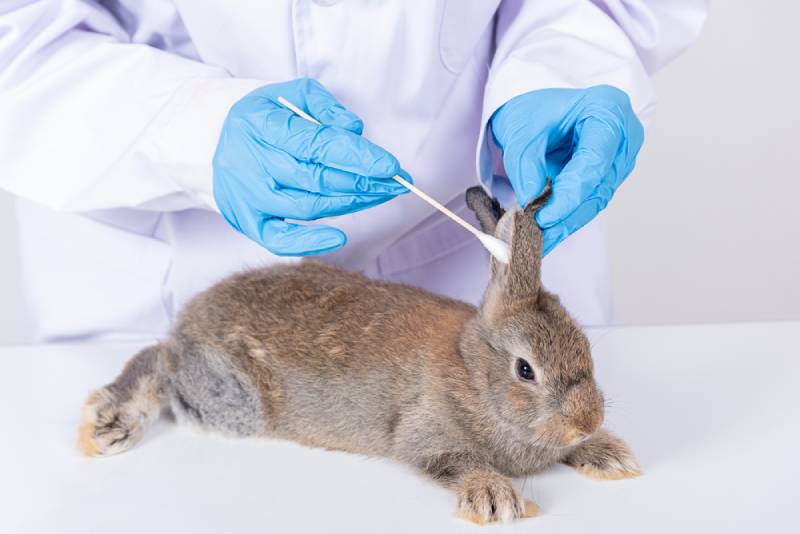
Click to Skip Ahead
Discover the fascinating world of Polish Rabbits, a miniature breed with a spunky and friendly personality. Read on to learn more about their unique traits and why they make excellent pets for experienced rabbit owners.
Breed Overview
Size:
Miniature
Weight:
Up to 4 pounds
Lifespan:
7–12 years
Similar Breeds:
Netherland Dwarf, Jersey Wooly, Dutch, Holland Lop
Suitable for:
Experienced rabbit owners with other rabbits
Temperament:
Spunky, friendly, adaptable
Polish Rabbits are an interesting breed, known for their small size and energetic nature. They are not a mix of other breeds but have similarities with Netherland Dwarfs, Jersey Woolies, Dutch, and Holland Lops. Their core traits that people love include their spunky attitude, friendly demeanor, and adaptability to various environments.
Polish Rabbit Breed Characteristics
How Much Do Polish Rabbits Cost?
Polish Rabbits are relatively rare, originating from England in the 19th century. They were initially bred for showing purposes and later became popular pets due to their small size and charming personalities. Prices for Polish Rabbits may vary depending on factors such as lineage, coat color, and availability. Generally, you can expect to pay between $50 and $100 for a Polish Rabbit.
When breeding Polish Rabbits, be aware of potential genetic traits and health issues that may be passed onto offspring. Select breeding pairs carefully to minimize the risk of health problems. If purchasing a Polish Rabbit from a breeder, ensure they follow responsible breeding practices and prioritize the health and well-being of their rabbits.
Consider adopting a rabbit from a shelter or rescue organization rather than purchasing from a breeder. Adopting a rabbit offers numerous benefits, including providing a home to a rabbit in need, potentially lower adoption fees compared to purchasing from a breeder, and the opportunity to adopt a rabbit that may already be spayed or neutered. Search for local rabbit rescues or shelters, or consult online resources to find a Polish Rabbit available for adoption.
Temperament & Intelligence of the Polish Rabbit
Polish Rabbits are known for their spunky, friendly, and adaptable temperament. They are intelligent animals that can be trained to perform simple tricks and tasks. Due to their sociable nature, they enjoy the company of humans and other rabbits, making them suitable companions for experienced rabbit owners.
Do These Rabbits Make Good Pets? 👪
Yes, Polish Rabbits make good pets, especially for experienced rabbit owners who can provide proper care, attention, and socialization. Their small size, charming personality, and adaptability make them an appealing choice for those looking for a lively and affectionate companion.
Does This Rabbit Get Along With Other Pets?
Polish Rabbits generally get along well with other rabbits, especially when introduced at a young age. However, they may not be suitable companions for larger or more aggressive pets, such as dogs and cats, due to their small size and vulnerability. It is essential to supervise interactions between Polish Rabbits and other pets to ensure their safety and well-being.
Things to Know When Owning a Polish Rabbit:
Food & Diet Requirements 🥕
Polish Rabbits have similar dietary requirements to other rabbit breeds. Their diet should consist of high-quality hay, fresh vegetables, and a small number of pellets. Hay should make up the majority of their diet, as it helps maintain proper digestion and dental health. Fresh water should always be available to them.
Habitat & Hutch Requirements 🏠
A Polish Rabbit’s hutch should be spacious enough to allow them to move around comfortably. The hutch should be at least four times the length of the rabbit and include separate areas for sleeping, eating, and playing. A secure outdoor run is also recommended to provide them with adequate exercise and mental stimulation.
Exercise & Sleeping Needs 🐇
Polish Rabbits are energetic and require daily exercise to maintain their physical and mental health. Provide them with at least 3–4 hours of supervised outdoor time in a secure area, along with toys and activities to keep them engaged. Ensure they have a comfortable and quiet sleeping area in their hutch to rest and relax.
Training 🥎
Polish Rabbits are intelligent and can be trained to perform simple tricks, such as hopping on command or retrieving small objects. Use positive reinforcement techniques, such as treats and praise, to encourage desired behaviors. Patience and consistency are key when training your Polish Rabbit.
Grooming ✂️
Polish Rabbits have short fur that requires minimal grooming. Brush them weekly using a soft-bristled brush to remove loose hair and keep their coat clean and healthy. During shedding seasons, increase the frequency of brushing to prevent hairballs.
Lifespan and Health Conditions 🏥
Polish Rabbits have an average lifespan of 7–12 years when provided with proper care and attention. They are generally healthy animals but may be prone to certain health conditions.
Schedule annual check-ups with a veterinarian experienced in rabbit care to monitor your Polish Rabbit’s health and address any concerns. Discuss appropriate preventative care and vaccinations with your veterinarian to maintain your rabbit’s overall health.
Male vs Female
Male and female Polish Rabbits have similar temperaments and make equally good pets. However, males tend to be more territorial and may spray urine to mark their territory. Neutering males can reduce this behavior and make them more docile. On the other hand, spaying females can help prevent reproductive cancers and improve their overall health.
3 Little-Known Facts About Polish Rabbits
1. They Are Not Originally from Poland
Despite their name, Polish Rabbits are not originally from Poland. They were first bred in England during the 19th century. The origin of their name remains unclear, but it is thought to be a misnomer or possibly derived from the term “polished,” referring to their sleek and shiny coat.
2. They Were Bred for Show Purposes
Polish Rabbits were initially bred as show animals due to their small size, unique appearance, and distinctive markings. Over time, they gained popularity as pets because of their charming personalities and adaptability to various environments.
3. Blue-Eyed Beauties
While most rabbits have brown eyes, some Polish Rabbits can have striking blue eyes, particularly those with Himalayan or Californian coat patterns. This unique feature adds to their appeal and makes them even more visually striking.
Final Thoughts
Polish Rabbits are an endearing and captivating breed that can make wonderful pets for experienced rabbit owners. With their spunky personality, friendly nature, and adaptability, they are sure to win your heart. Keep in mind that they require proper care, attention, and socialization to thrive. If you’re looking for a small, energetic, and affectionate companion, the Polish Rabbit might be the perfect fit for you.
Feature Image Credit: oyvindpe, Shutterstock









